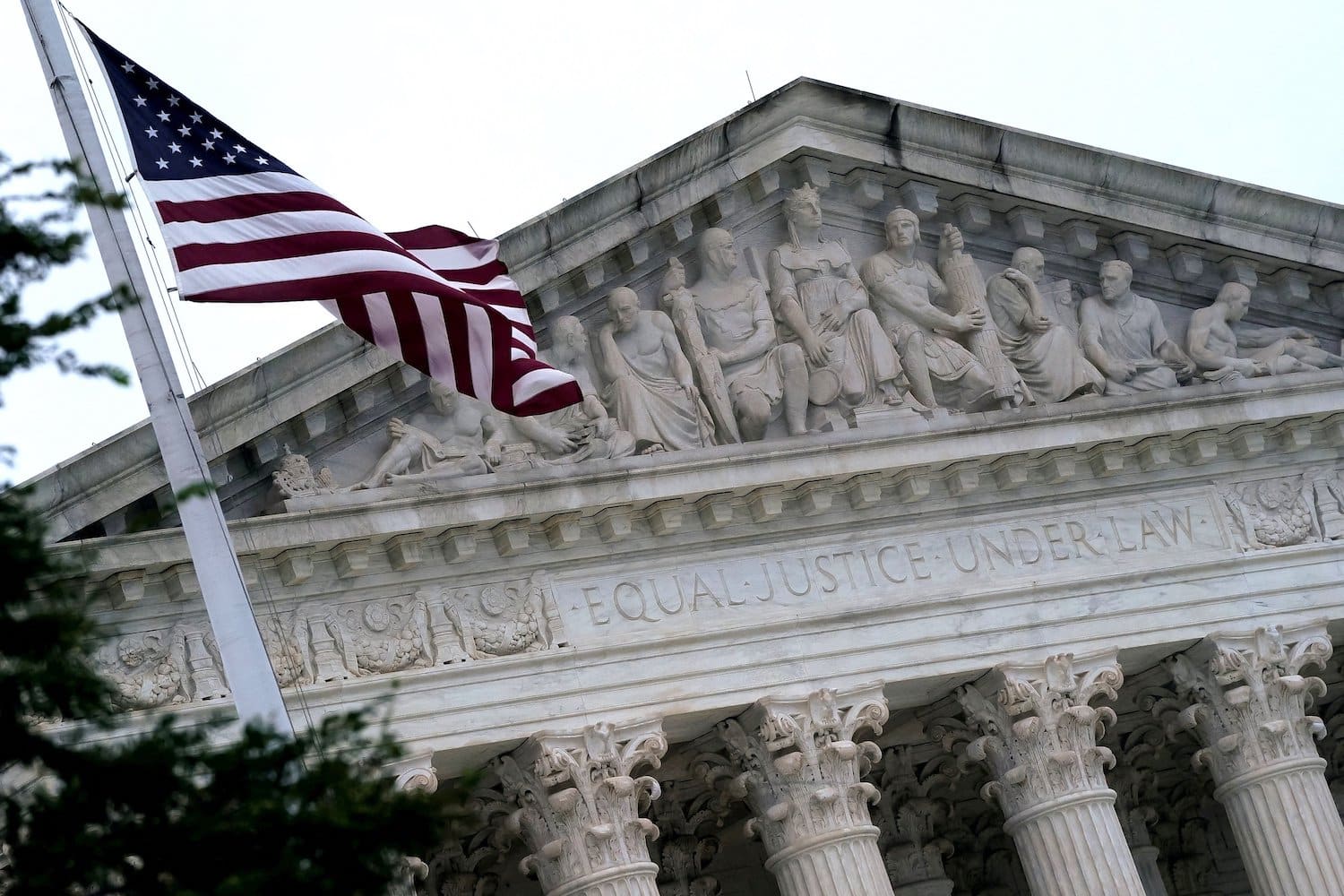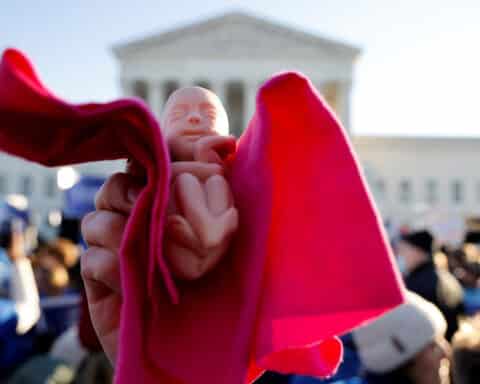A case involving accommodation of religion currently before the Supreme Court, likely to be decided in the coming weeks, shows how natural law reasoning must enter into legal decisions — even if it is not explicitly cited.
The case (Groff v. DeJoy) involves a former postal worker from rural Pennsylvania, Gerald E. Groff, who as a devout Evangelical Christian believed that Sunday, the Lord’s Day, should be reserved for things of God — worship, family, service to the poor — and ought not be occupied with non-essential commercial activity.
Groff’s convictions, by the way, are close to what Catholics ought to believe and practice also, although few of us do. See Pope St. John Paul II’s largely unheeded call for the Church to return to a robust observance of Sunday: Dies Domini (1998).
You may have observed that throughout the country, to remedy its inadequate funding, the postal service has started working for Amazon, delivering their packages now on Sundays.
Difficulties at stake in the case
There are lots of dysfunctions here, as we see:
- a postal service that mainly delivers junk mail now; and
- which is so poorly funded that it must sell its services to a non-government entity; yet
- this entity delivers on Sundays, even to Christians who do not want deliveries on Sundays; while
- many Christians already shop on Sundays, the same as any other day.
(Note: It is possible to “tell” Amazon not to deliver to you on Sundays. But Amazon does not make this easy. Ordinary folks lack the wherewithal to figure it out. Thus, people who shop on Amazon are ineluctably drawn into conducting business on Sunday.)
Groff tried to avoid working on Sundays, at first, by transferring to a smaller, more remote office. But eventually, Amazon delivery arrived there also. His manager tried to accommodate him by offering him Sunday mornings off. Groff replied that it was the Lord’s “day” not the Lord’s “morning.” Eventually, fellow employees became upset that they had to cover for him. The postal office claimed a “morale” problem and fired Groff. Groff sued, complaining that his dismissal amounted to discrimination on the basis of his religion.
Religion and the Civil Rights Act
In past decades, the case would have gone nowhere — surprisingly so. I say “surprisingly,” because one might have thought that religious practice would be at least as highly protected in the workplace as, say, race or ethnic origin. Doesn’t the famous Civil Rights Act (“Title VII”), treat religion as on a par with these other classes?
Yes and no. Title VII says that employers must make reasonable accommodations for the religious practices of employees unless doing so amounts to an “undue hardship” for them. However, the Supreme Court in its notorious Hardison decision (1978) interpreted “undue hardship” to mean, in effect, the slightest inconvenience. Hardison was an employee of Trans World Airlines whose wish to observe Saturday as the sabbath would have cost that major airline all of $150. The Court found such an accommodation to be an “undue hardship” and ruled in favor of the airline.
You might wonder how the Court could gut the Civil Rights Act specifically in its treatment of religion. And you would not be alone. Almost no one has liked Hardison.
And you can see that Groff’s dismissal is perfectly acceptable if Hardison remains the ruling precedent. That is why friends of religious liberty are gratified that, in taking up the Groff case, the Supreme Court seems willing to reconsider and overrule Hardison.
The natural law
But let us step back and ask what the natural law says about all of this. The natural law holds that all human beings are bound to set aside some time for honoring God. The reason is that God is our creator and source of all blessings. Creatures honor the Creator by some sort of sacrifice. Time represents our being and our lives. Therefore, the sacrifice specifically of our “time,” by directly devoting ourselves to him, is most fitting.
Accordingly, we are bound by the natural law to set aside time for God each day, and each week, and each year. But how precisely we are to do this, the natural law does not say. We need to discern in conscience what God asks of us. If someone is a Catholic, he discerns that God asks him to devote Sunday in the week to the things of God. If someone is Jewish, the sabbath is Saturday; and so on.
In a just society, then, where the natural law was universally acknowledged, it would be taken for granted that everyone regarded himself as obliged to set aside some time for God. This obligation would be seen as higher than any obligation arising from the government or an employer. Therefore, it would need to be “accommodated,” in the same way that any command from a superior authority needs to be “accommodated” by a lesser authority. For example, if you are called for jury duty, your employer must accommodate that obligation.
But also it would be recognized that conscience played a large role here and that pluralism of religious observance should be welcomed in the workplace, as a witness to the primacy of conscience.
The natural law also says something about the nature of work. It says that work has special dignity because through honest work we “participate” in the creative work of God. Also, the sacrifices we make, of sweat and toil, to serve our neighbor, have great value in the sight of God. Therefore, there is an especially close connection between religious observance and work. In a just society, this connection would be recognized and even celebrated. Religious devotion would be welcomed into the workplace as distinctively contributing to it.
An undue hardship?
But let us return to Groff. The “friend of the Court” briefs in the case, as you can imagine, mainly focus on Hardison. They argue, rightly, that it was badly decided; its commentary on “undue hardship” should not enjoy the force of precedent; it has worked mischief in lower courts; it is out of sorts with other bodies of law; it especially harms minorities. All of these things are true.
And yet if religion were simply a personal preference, like a hobby or an avocation, it would deserve no special accommodation. No employer needs to accommodate his employee’s sincere commitment to playing golf on Wednesdays. Or if religion were compelling but, like a drug addiction, made someone worse as a worker, it ought to be discouraged and not welcomed. And if religious pluralism testified to nothing, it would have little to no value.
These deeper questions, answered by natural law, are lurking in the background. They cannot of themselves be settled by brief clauses like “free exercise” in the First Amendment.
Father Richard John Neuhaus used to argue that we face a “Catholic moment” when Catholics because of their familiarity with natural law are specially poised to come to the aid of the country. In this, he followed Father John Courtney Murray. Such ideas are perhaps no longer as trendy as they used to be. But they remain deeply true nonetheless. Indeed, I was gratified to find that the “friend of the Court” brief, which best succeeded at evoking these deeper considerations was filed by a Catholic entity, CatholicVote.org, and written by Antony Kolenc at Ave Maria School of Law. Interested readers might wish to consider it here.





